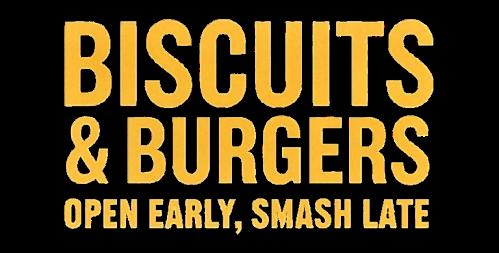
Alexandros Theodossis // Alligator Staff
Cameron Hogan, owner of Fade Fitness, leads a space focused on training, growth and consistency. Read more on pg. 5.


Alexandros Theodossis // Alligator Staff
Cameron Hogan, owner of Fade Fitness, leads a space focused on training, growth and consistency. Read more on pg. 5.
By Leona Masangkay Alligator Staff Writer
AI can perform quick, repetitive jobs like data entry and customer service. But there are still some careers that require a human touch — or chipping hammer.
With the implementation of AI in the workforce on the rise, the demand for trade labor has grown. Trade labor, or skilled trade, is a career requiring technical skills and hands-on involvement to maintain and develop infrastructure.
Santa Fe College opened the Ralph W. Cellon Jr. Institute to help foster the future of blue-collar employees and its own demand for trade skills, including welding and air conditioning.
Blue-collar jobs have been experiencing an increase in both opportunities and demand over the past decade. The development of AI in the workforce leads many individuals to
opt for jobs that are less threatened by newer technologies. For many, such as 32-year-old Santa Fe alumnus Rowdy Turner II, trade jobs are the most stable option.
“Learning how to weld is a doorway to hundreds of different things that you can do,” he said.
Turner earned a certificate in welding technology from Santa Fe in 2024, and he currently works in Gainesville as a welder contracted under Miller Electric. But the former Dollar General warehouse manager said his love for welding wasn’t the only factor that pushed him to pursue his current career full-time.
“AI [is a] reason why people are turning to it. That’s why I turned to it,” Turner said, referring to his job as a welder.
Turner learned Santa Fe offered a welding certification program as he transitioned to metalwork after a stroke lost him his warehouse job. Upon enrolling, he discovered there was a long waitlist of people who were also seeking to earn their certification in welding technology.
Turner said he nearly “begged” the admissions director to allow him into the program “as soon as pos-
By Victoria Riccobono Alligator Staff Writer
The Hispanic-Latine Student Assembly, an annual welcoming event, will go on this year with nearly half the budget it once had, joining other UF welcome assemblies that lost their Signature Event designations.
For the past three years, cultural welcoming groups including HLSA, the Pride Welcome Assembly, the Asian American Student Assembly
and the Black Student Assembly were guaranteed funding, staff advising and promotional support under Signature Event status. That security ended when UF declined to renew the designation, forcing the groups to seek new funding sources and handle more of the administrative workload themselves.
Hector Isiah Collazo, a 22-year-old UF senior pursuing a dual degree in microbiology and cell science and anthropology, said the budget for HLSA was reduced by nearly half, though The

Alligator could not confirm that number.
A university spokesperson could not comment in time for publication.
The HLSA event, hosted by the HispanicLatine Student Association, has opened the Fall semester for over 27 years, welcoming students to campus with food and live performances. Last year, the event drew a crowd of about 700, Collazo said.
Collazo, HLSA’s executive director, said the group is still expecting 700 to 750 attendees this
year when it welcomes students to the Reitz Union Aug. 27. But still, the shift has felt unsettling, he said.
“We all thought that it was no longer going to be around,” he said. “[It’s] disheartening and also kind of scary.”
The assembly’s theme this year is “Stronger Together,” the same phrase the Hispanic-Latine Student Association used in a March 12 Instagram post announcing that UF would not re-


The actor spoke about his iconic roles and dished out advice to a crowd of 4,000 students Aug. 21.
By Angelique Rodriguez Alligator Staff Writer
On the first day of classes, students lined up and waited in the Gainesville heat to see the man who played a chemistry teacher-turned-drug lord on TV.
Award-winning actor Bryan Cranston spoke to thousands of UF students about his acting career, behind-the-scenes memories and life advice on the evening of Aug. 21 in the O’Connell Center.
The Accent Speakers Bureau, a UF Student Government-run speakers’ bureau, has brought influential personalities to campus since 1967. The agency has hosted celebrities like Ke Huy Quan, Sal Vulcano and Tim Tebow.
Cranston’s more famous roles include his three-time Emmywinning turn as Walter White in “Breaking Bad” and Hal in “Malcom in the Middle.” He’s also collected two Tony Awards and a Golden Globe along the way.
The arena was charged with anticipation and filled with excited murmurs as students overflowed the seats, waiting for Cranston to arrive.
When Cranston walked onstage, excitement pulsated through the room. Students jumped out of their seats, erupting into loud cheers and applause. He laughed, pointing at a student wearing a black top hat reminiscent of his “Breaking Bad” character.
Another student even came dressed up in a hazmat suit, another nod to Cranston’s “Breaking Bad” persona. Others made posters depicting Walter White in his iconic hat and sunglasses.
According to Nathan Feuerberg, Accent’s chair, over 4,000 students came to hear Cranston speak. Many of them are avid fans of his work, such as Julia Vega, a 20-year-old UF sociology junior. She said she admires his path to the screen.
“I think he’s a really great character actor. I love his journey, too — I know he started acting at a relatively young age,” Vega said.
Ted Spiker, the department chair of the College of Journalism and Communications, interviewed Cranston about his early acting career, trying new things and connecting to his roles.
Cranston recalled how he fell in love with acting in a college class in which, for an assignment, he played a couple with a girl he had a crush on. Enchanted by a stage kiss and thinking she would like him back, he asked her out, only to be embarrassingly rejected, he said.
“I thought, ‘Oh my god!’” he said. “This is a whole world I have to explore!”
He also spoke about his brief career as a stand-up comedian, which he said was not his end goal.
He’s had some unsuccessful performances, he said, but still
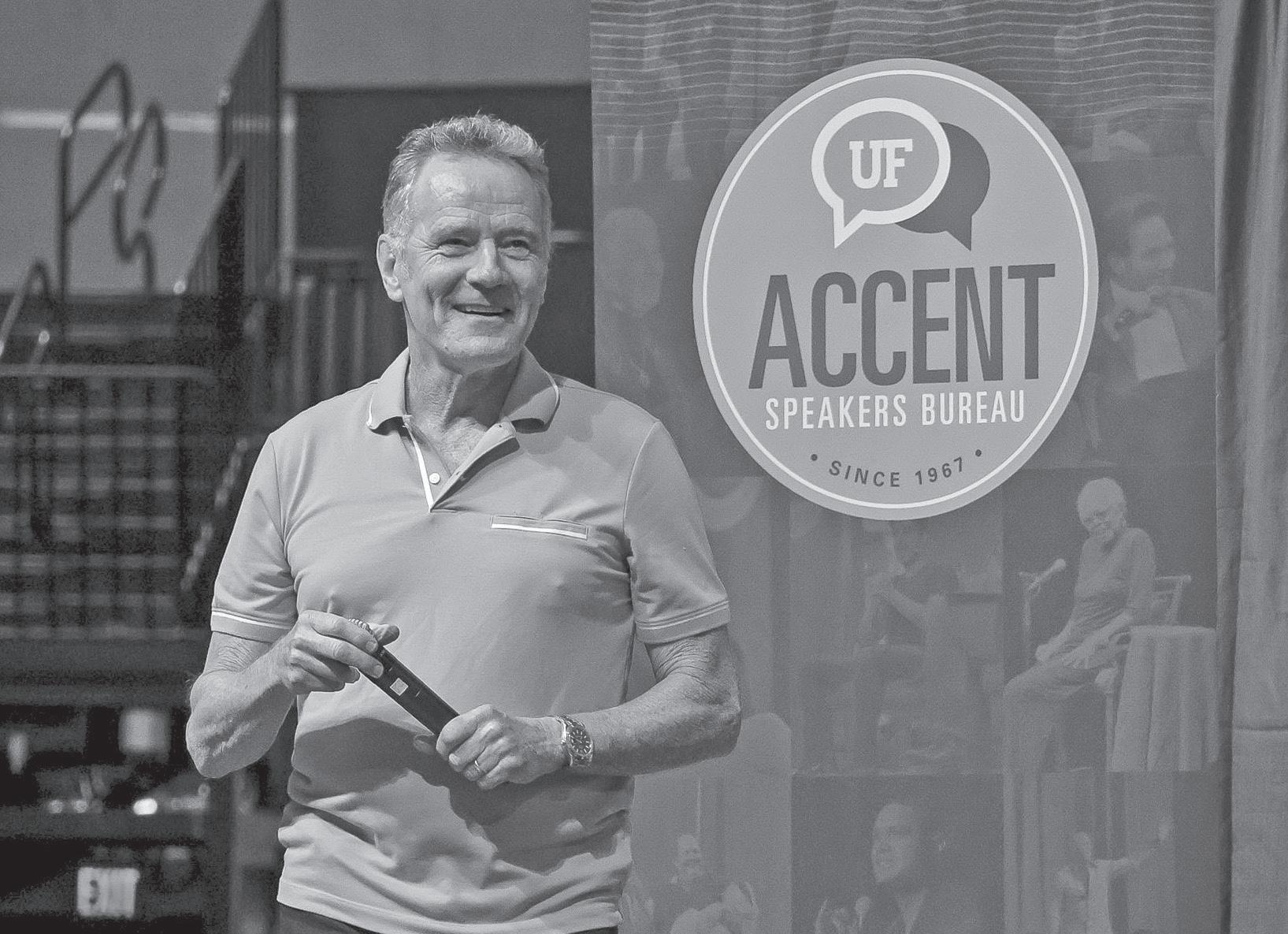

Have an event planned? Add it to the alligator’s online calendar: alligator.org/calendar
advised students to jump into something that scares them.
“Just have the courage to step on stage not having a clue what you're about to say… I was challenged by the idea,” he said. “What if I wrote my own material and did it? And I did it for nine months just to prove that I wasn't afraid of it anymore.”
He said he had to prove to himself he could do it, and that he wasn’t afraid of failure.
“It's a wonderful thing to be able to put yourself in the position of being a beginner,” he said.
Recently, Cranston worked on a few more acting jobs before planning a brief pause from the screen in 2026, during which he will spend more time with his wife, he told Entertainment Weekly.
He most recently appeared in “The Phoenician Scheme,” a Wes Anderson-directed film that premiered in theaters on June 6. There is also a “Malcolm in the Middle” reunion in the works, Cranston told the Associated Press earlier this year.
Daniel Mariscal, an 18-year-old UF nutritional science freshman, said he liked the advice Cranston gave about selling yourself in an interview with confidence instead of desperation.
“A lot of times, we go into an interview nervous because we're like, ‘Are they going to like me? Are they not going to like me?’ But it’s about going into it with that mindset,” Mariscal said.
Cranston gave more than one tip to students during the event. Sebastian Larrauri, an 18-yearold UF industrial engineering freshman, loved his advice about always being a beginner.
“This past year I’ve tried a lot of new things, so I’ve been a beginner, and I think it's really cool that he formulated it in a good way,” Larrauri said.
In between comical segways and behind-the-scenes stories, Cranston advised students to always jump at opportunities wearing “quiet confidence,” even when things do not go as planned.
“When something happens that you take in as horrible, it may be life prepping you for something greater,” he said.
@angeliquesrod arodriguez@alligator.org

Not officially associated with the University of Florida Published by Campus Communications Inc., of Gainesville, Florida
352-376-4458 NEWSROOM:
Editor-In-Chief
Engagement Managing Editor
Digital Managing Editor
Enterprise Editor
Metro Editor
Alissa Gary, agary@alligator.org
Zoey Thomas, zthomas@alligator.org
Sophia Bailly, sbailly@alligator.org
Shaine Davison, sdavison@alligator.org
Megan Howard, mhoward@alligator.org
21, 2025.
University Editor El Caimán Editor
Maria Avlonitis, mavlonitis@alligator.org
Opinions Editor
Corey Fiske, cfiske@alligator.org
Juliana DeFilippo, jdefilippo@alligator.org
Vera Lucia Pappaterra, vpappaterra@alligator.org
Sports Editor
Assistant Sports Editor
Assistant
Multimedia Editor
Multimedia Editor the Avenue Editor
Luke Adragna, ladragna@alligator.org
Mandy Roman, mroman@alligator.org
Sydney Johnson, sjohnson@alligator.org
Noah Lantor, nlantor@alligator.org
Copy Desk Chief Pristine Thai, pthai@alligator.org
Editorial Board
Advertising Office Manager
Alissa Gary, Zoey Thomas, Sophia Bailly, & Pristine Thai
352-376-4482
Sales Representatives Cheryl del Rosario, cdelrosario@alligator.org
Sales Interns
Paige Montero, Sydney Sesaldo, Simone Simpson, JP Fournier, Jasmine Chavez, Faith Shimick, Yaxel Valladares
Nethumi Ratnayake, Sofia Korostyshesky, Rachel Al Baissari
352-373-3463
Classified Advertising Manager Ellen Light, elight@alligator.org
352-376-4446
Comptroller Delia Kradolfer, dkradolfer@alligator.org
Bookkeeper Cheryl del Rosario, cdelrosario@alligator.org
Administrative Assistant Ellen Light, elight@alligator.org
ADMINISTRATION
352-376-4446
General Manager Shaun O'Connor, soconnor@alligator.org
President Emeritus C.E. Barber, cebarber@alligator.org
IT System Engineer Kevin Hart
Production Manager
Namari Lock, nlock@alligator.org
Publication Manager Deion McLeod, dmcleod@alligator.org

Got something going on? Want to see it on this page? Send an email with “What’s Happening” in the subject line to engagement@alligator.org. To request publication in the next day’s newspaper, please submit entries before 5 p.m. Please model your submissions after the above events and keep them to 150 words or fewer. Improperly formatted “What’s Happening” submissions may not appear in the paper. Press releases will not appear in the paper.
The Independent Florida Alligator is a student newspaper serving the University of Florida, published by a nonprofit 501 (c)(3) educational organization, Campus Communications Inc., P.O. Box 14257, Gainesville, Florida, 32604-2257. The Alligator is published Monday mornings, except during holidays and exam periods. The Alligator is a member of the Newspaper Association of America, National Newspaper Association, Florida Press Association and Southern University Newspapers.
The Alligator offices are located at 2700 SW 13th St. © Copyright 2020. All rights reserved. No portion of The Alligator may be reproduced in any means without the written consent of an officer of Campus Communications Inc.
Subscription Rate: Full Year (All Semesters) $75
The Alligator strives to be accurate and clear in its news reports and editorials. If you find an error, please call our newsroom at 352-376-4458 or email editor@alligator.org
from pg. 1
new HLSA’s Signature Event status.
The driving force
The change comes after UF eliminated the Office of the Chief Diversity Officer, cut diversity, equity and inclusion positions and ended DEIrelated vendor contracts in 2023. The moves aligned with a Florida law prohibiting public universities from using state or federal funds on DEI initiatives.
The Graduate Student Council was the sole organization able to renew its Signature Event status.
The Pride Student Union, or PSU, chose direct Student Government funding to make up the lost funding, receiving $13,000 under an event budget. Meanwhile, HLSA, as well as the Asian American and Black student assemblies, turned to Roots — an SG agency focused on transition and welcome programs.
With Roots, the organizations receive help when it comes to event planning, funding and mentorship. But even with alternative funding, student leaders said the process is far more complicated than before.
Adjusting to differences
“We’ve kind of been stretched to our limit as we’ve been preparing
for our welcome assembly,” said Diego Herrada, a 19-year-old UF psychology junior and PSU’s internal vice president.
The lack of flexibility is one of the hardest changes, agreed Asif Islam, a 22-year-old UF graduate who worked with PSU last year.
“The benefit of Signature Events is you have basically a loose sum of money that you can choose to allocate as flexible as you want,” Islam said. “Student org money is allocated into fixed funds.”
Islam added that SG funding is not guaranteed because it works on a first-come, first-served basis, enabling organizations to receive lower budgets or be denied funding outright.
The administrative work that used to be handled by staff now falls on students, added Jonathan Stephens, a 22-year-old UF graduate who was last year’s PSU president.
“Obviously we want to be back on Signature Events, but that’s going to take a lot of state action to make that happen,” Stephens said. “The hope is that the university continues to support all student communities equally.”
Student leaders said Roots has helped but cannot fully replace Signature Event support.
“We have to get our designs approved by SG,” said Trunk Nguyen, a 19-year-old UF marketing sopho-
more who is the Asian American Student Assembly’s multimedia head. “There's a few more obstacles we have to go through to get things funded.”
Nguyen added that his assembly had to simplify programming this year despite maintaining consistency in planning.
Other budgeting losses
For some organizations, the loss of Signature Event status has spilled over into other programming.
“We have four events that we host every year that we didn’t get our funding for this year,” said current PSU president Steph Deleon, a 21-year-old UF accounting senior.
“I’m not sure how we’re going to host events when we barely have enough money to feed people during our general body meetings.”
The group, which is the largest LGBTQ+ organization at UF, still expects 425 to 450 attendees at its welcome assembly.
Members of the Women’s Student Association and the Black Student Union, which also lost their Signature Event status, did not respond to requests for comment.
@Vickyriccobono vriccobono@alligator.org
AI, from pg. 1
sible.” Now, thanks to Santa Fe’s newest institute, more people like him will be able to learn metalwork trades.
On Aug. 19, Santa Fe opened the Ralph W. Cellon Jr. Institute for Skilled Trades and Advanced Manufacturing on its Northwest Campus. According to Paul Broadie II, Santa Fe's president, the facility represents the college’s commitment to workforce development.
The institute expanded the trade programs at Santa Fe, specifically those in welding and heating, ventilation and air conditioning, or HVAC. It added an engineering technology advanced manufacturing degree program as well.
The institute has more classroom space for students to participate in hands-on activities and lessons. The new institute is set to double the school’s capacity for welding.
Broadie said the institute is meant to capitalize on growing job opportunities. Welding jobs anticipate a 6.9% job growth annually, and HVAC jobs expect an 8.9% growth annually for the foreseeable future, Broadie said.
While blue-collar demand is increasing, some white-collar jobs are struggling to expand.
Having fewer employees to pay offers an incentive to business owners, said Simon Rendall, the vice president of e-commerce for Pyramid Global Hospitality, a propertymanagement company.
Rendall has worked with AI hands-on for over three decades, and he incorporates it into marketing strategies for the brand.
Rendall said one hotel Pyramid Global Hospitality works with utilizes AI for customer service chats on its website. The property no longer needs many employees to handle phone calls because its AI chatbot answers people’s questions on its own without the consumer needing to interact with a living person.
“You don’t need to expand your workforce as much,” Rendall said. “That’s something that a lot of people in our industry are looking at.” Hospitality isn’t the only whitecollar field that AI has been affecting. Careers in fields like history, sales, customer service and writing face risks with the rise of AI, according to research by Microsoft.
Rendall said he was worried several common “white-collar skills are going to be consumed by AI solutions.”
While the future of AI is uncertain, it will continue to develop as a system that maximizes efficiency and time management, agreed UF engineering professor Diego Alvarado.
“AI is a technology that is here,” Alvarado said. “It’s not even coming. It’s here, and we need to adapt to it.”
@leo_amasangkay lmasangkay@alligator.org

By Maddie Herring Alligator Staff Writer
The first week of school means thousands of decisions for freshmen — specifically between the thousands of clubs UF offers.
As the school year starts off, some freshmen feel pressure to join clubs to get the “college experience.” But it can be a balancing act to handle school work and the demand of clubs.
Over the Fall semester, The Alligator will be keeping in touch with some of these freshmen, tracking the organizations they join and drop throughout the semester — and how many they’re still involved with by the end.
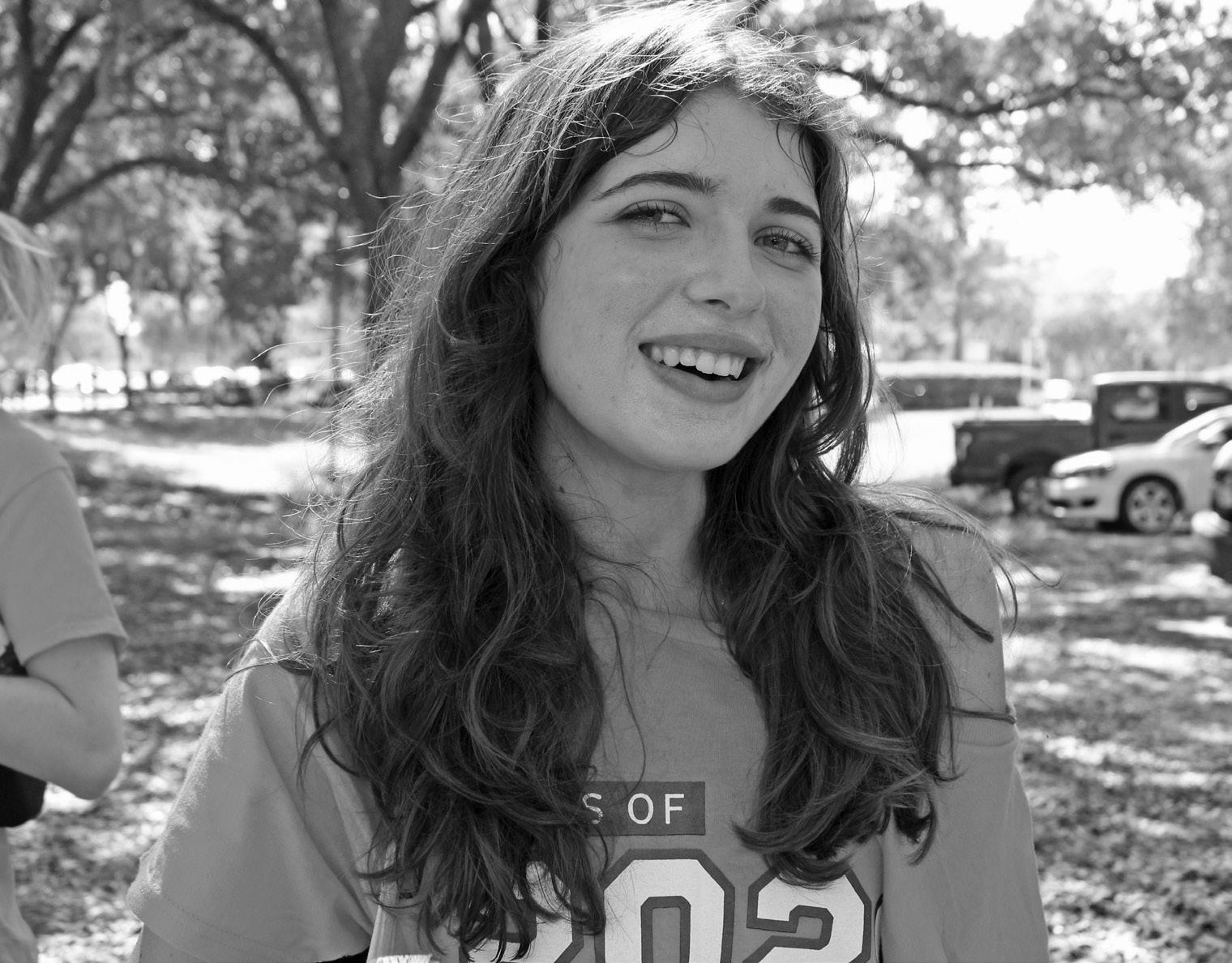
Mira Kraev, an 18-year-old UF material science and engineering freshman
Mira Kraev said she’s intimidated by the pressure to join several clubs. They’re really important, she said, and employers take the experience seriously when it comes to applying for jobs and internships.
“If you’re not involved in anything, it just looks like you don’t care,” Kraev said. She said she’s worried she won’t have time to study if she’s “overdoing it with clubs.” Kraev plans to join organizations related to her major, like engineering clubs and the Society of Women Engineers.
“I’ll meet people who will connect to me and motivate me to try more,” she said.
To start their integration, freshman students enjoyed food and explored the clubs UF offers at the annual Freshman Kickoff on Aug. 20. Leadership clubs, sports teams and interest groups attended. Even Gator Connect, a resource for students to discover what clubs fit them best, marketed itself to new students.
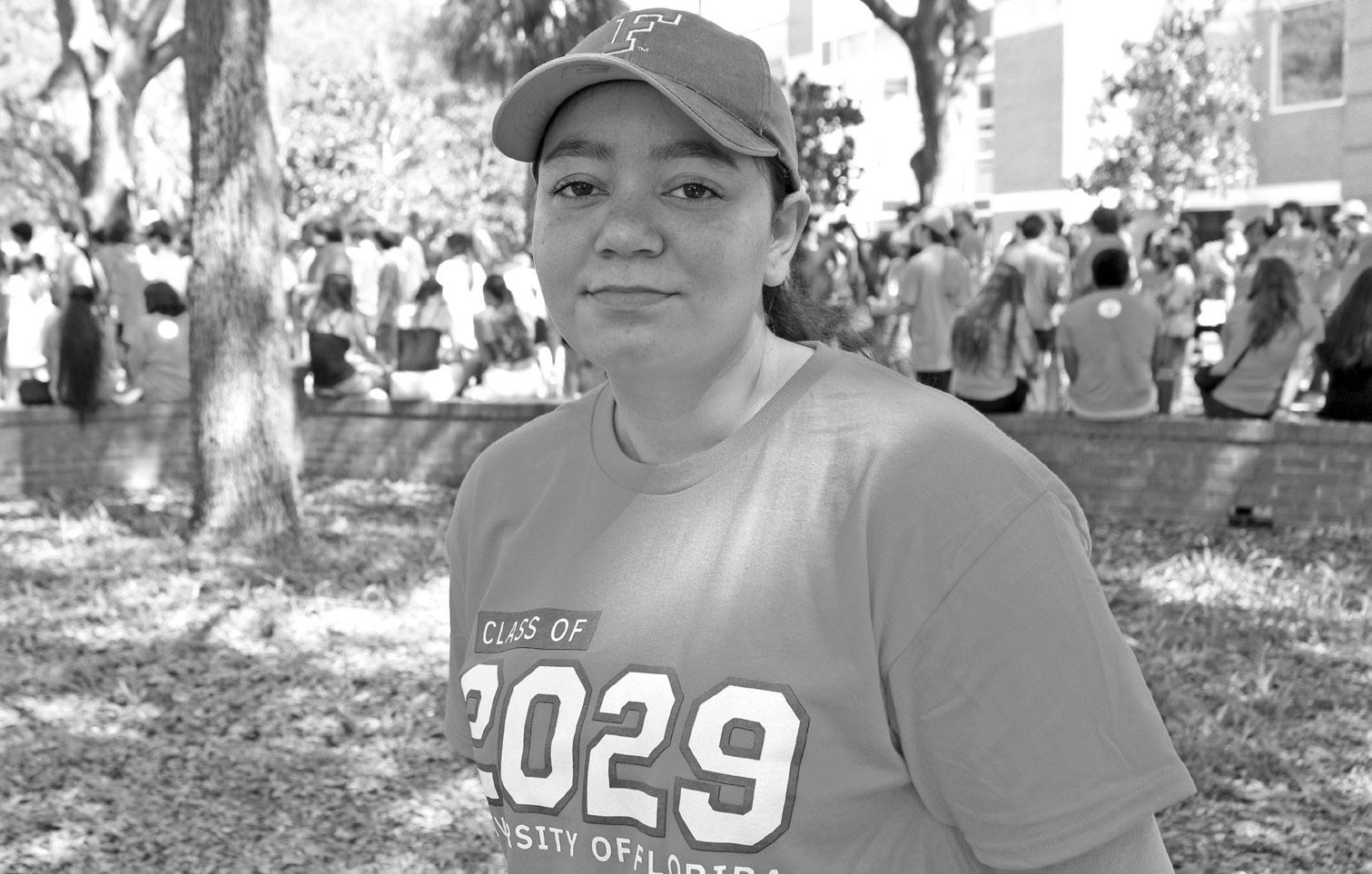
Arianna Estrada, an 18-year-old UF business freshman
Students are still trying to navigate what works for them. Freshmen, similar to Arianna Estrada, believe that clubs will allow connections to be made. Estrada said joining clubs gives her a platform to make friends and mingle with upperclassmen.
“It’s all about networking,” Estrada said.
Still, she can’t shake the nerves of everything that is on her plate. There’s an expectation to be able to balance having the right amount of clubs, navigating college life and simultaneously making sure it all fits into your work schedule, she said.
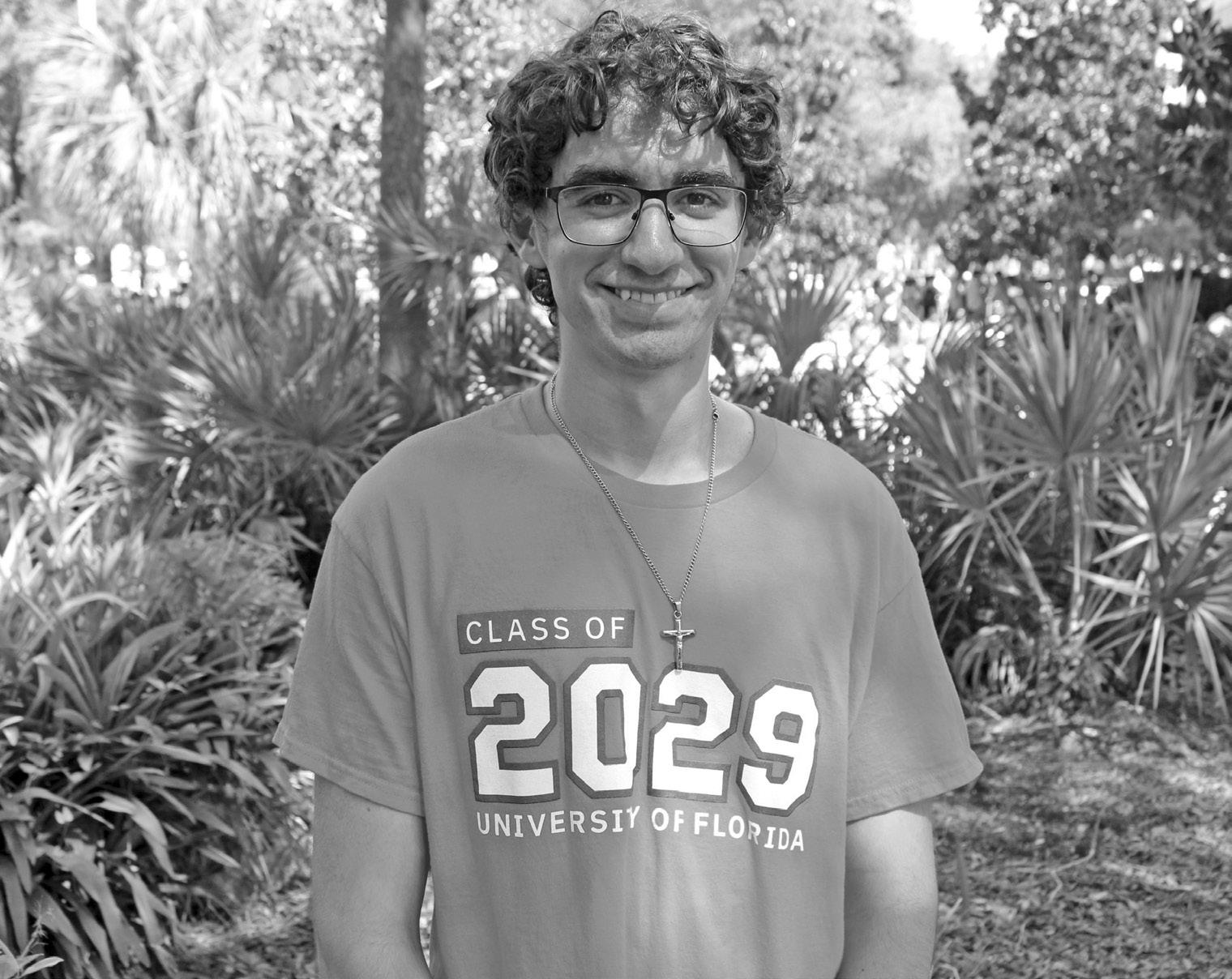
Brayden Allen, an 18-year-old UF computer science freshman
Not everyone is nervous of the workload they’re going to face. Some even have high hopes for their busy schedules. Brayden Allen said he is looking forward to all of the clubs UF offers. Although he feels some pressure to join clubs, Allen said it isn’t overwhelming. He feels like he still has a choice in what he wants to do, and he knows he can cut back on clubs if he has too much work.
“I want to do things that are really good in my major,” he said

Jane Jones, an 18-year-old UF exploratory freshman
Jane Jones said she thinks students are able to have more free time in college through customizing class schedules to have days off. That makes it easier to manage time and find things you love to do, she said.
“The most important thing is making sure you’re making good decisions,” Jones said. “And if you follow that path, you won’t get burned out.”
By Teia Williams Alligator Staff Writer
From style to personal wellness, some Black-owned businesses in Gainesville try to go a step further in caring for and improving locals’ wellbeing. As National Black Business Month comes to a close at August’s end, here’s some local spots to visit.
Salon Syx
Dennayce Mavin, a 38-year-old hair stylist based in Gainesville, works on all hair types with a focus on natural hair care, including weaves and cuts. She also owns Salon Syx, a business for which she travels to do hair for weddings and funerals.
Mavin got her cosmetology license in 2008 at the College of Central Florida. She opened her first salon in Ocala and has also worked at two salons in downtown Gainesville. Her clients have followed her throughout North Central Florida, she said.
“I’m glad to know that the things that I do in the community, they’re not going unnoticed as far as just being a business owner, a good person, a pillar in the community,” Mavin said.
Mavin also performs mortuary cosmetology, which includes hairstyling on dead bodies. She’s practiced other aspects of the job, too, like dressing the clients and being emotionally present for the families. She’s working on getting her professional license online at American Academy McAllister Institute.
Recently, Mavin participated in Cutz 4 Christ in Williston Aug. 10, where stylists like her served over 250 children with free styles, cuts and braids. She also brings together small businesses every summer for a showcase to interact with the community.
“It’s really not about me,” she said. “It’s more so about helping the generation that
comes after me.”
Mavin’s clients can see her at Salon Marvin Hayes where she is accepting appointments.
The Goddess Project
The Goddess Project, founded by 37-year-old Alexandria Gibson, offers holistic health education and promotes natural healing through ancestral practices to help the Gainesville community overcome ailments and pain.
Some of the natural services provided are Reiki and chakra alignment, which are meant to help with physical and mental pain, and yoni steaming, which cleanses the vaginal area by squatting over an herbinfused pot of hot water.
She had first practiced yoni steaming on herself when she was no longer getting her menstrual cycle monthly and was concerned about health complications. After she steamed, her cycle came back, she said.
Gibson then began practicing natural healing on clients after she met an HIV-positive client asking for help with pain management. Gibson worked with him in the last year of his life to ease his pain, bathing him in herbal baths and packing his sores with a homemade herbal salve.
In 2018, Gibson opened The Goddess Project, located in Gainesville. It weathered challenges, namely Covid-19 and Gibson giving birth to her fourth child.
The project has always focused on the wellness of others, she said, and Gibson now hosts wellness workshops to further connect with the community.
The Goddess Project also works with nonprofit organizations like Bailey Learning and Arts Collective and Women of Xcellence Inc., which sponsor food and activities for the project. Nonprofits and community donations have covered the cost for clients to attend sessions for free.
“In this season, The Goddess Project is moving to mutual aid,” Gibson said.

Fade Fitness
Fade Fitness serves as a safe place to reach fitness goals, according to 24-yearold Cameron Hogan, who founded the local gym in 2023.
Hogan first worked with clients as a personal trainer at public gyms until he was able to open his own location in north Gainesville.
Fade Fitness also has an online training program of more than 100 videos, which Hogan recorded personally, for those not in the local area. His content reaches clients worldwide, from the United Kingdom to Mexico, he said.
Hogan is also creating an app for his business.
Outside of Fade Fitness, Hogan also hosts Rise N’ Run Club in Gainesville, a free run session that meets twice a week in different locations in the city.
“People can come together, network and meet other people in the same journey, trying to get back on their feet,” he said.
Fade Fitness will hold a one-year anniversary run club event Aug. 31 with a live DJ and vendors.
@teia_williams twilliams@alligator.org
By Alexa Ryan Alligator Staff Writer
UF graduates Graham Bernstein and Konstantin Nakov fought for years for Florida to ban corporal punishment in schools — often known as paddling. Their efforts came to fruition earlier this year with a law requiring parents to consent before their kids are struck.
Before the law took effect, Florida public schools provided parents, upon request, with a written statement explaining what the punishment was and why it was administered. Now, parents must opt in to the practice with written consent before their child is punished.
“[School] is a place where kids should feel safe and welcome, always,” said Nakov, 24, “and that’s not something that is really compatible with corporal punishment.”
Nineteen school districts in Florida allow corporal punishment, with a total of 516 kids in those dis-
tricts being struck during the 202324 school year, according to the Florida Department of Education.
Most districts have either banned the practice, like Alachua County, or already require parental consent.
According to the Florida law, which went into effect July 1, corporal punishment encompasses using physical force on a student as a mode of discipline. School boards can either request consent for use of corporal punishment for the whole year or before each use.
This law comes after a UF student group, Florida Student Policy Forum, partnered with conservative activist group Moms for Liberty to push lawmakers to accept the bill.
Bernstein, a recent UF graduate and former member of the policy forum, started advocating against the use of corporal punishment in 2022.
Soon after, Nakov, who said he couldn’t believe corporal punishment was still used in school, joined the project.
At first, Nakov and Bernstein, along with the policy forum, advocated to outlaw corporal punishment entirely. But, they remember struggling to find a sponsor for the
bill and being met with resistance from lawmakers who believed corporal punishment can be an effective method of discipline.
Still, they thought they could find a way to push the legislation through. That’s when they came up with a compromise: Corporal punishment could exist, but only for the parents who wanted it.
Their first step was to enlist Moms for Liberty. The group had influenced Florida politics before, most notably to unshelve school library books that some parents found inappropriate. Among its self-described goals are to expand parental rights — an angle Nakov and Bernstein were beginning to embrace.
Bernstein said he believes requiring parental consent would mitigate the consequences of corporal punishment for everyone. It would provide more safeguards for students and protect parental rights, he said.
“If you add more regulations to a thing … That’ll, of course, reduce the number of kids who get hit,” he said.
Bernstein expects that corporal punishment will gradually be
phased out as a result of the bill, he added.
Though most of the state has already outlawed the punishment, Suwannee County, Florida, had the most instances of it during the 202324 school year — a total of 74 cases that made up about 1.2% of students (other counties that use the punishment had higher rates compared to their student populations).
Katlyn Howard, a 28-year-old mother of two children at Riverside Elementary School in Suwannee County, said the district has sent home a green paper every year allowing parents to opt out of the practice.
“That is very interesting to know that Suwannee County parents allow their kids to get spanked at school, because I would never,” Howard said.
In some documented cases of corporal punishment, parents’ wishes weren’t always followed.
In 2021, a school employee in Liberty County, Florida, paddled an 18-year-old girl even though she and her mother did not consent to it.
Howard said hearing about the
incident “makes me want to ask my kids if they’ve ever gotten a spanking at school.”
Many of the schools that allow corporal punishment in Florida are in rural areas in the panhandle with lower median incomes, according to Florida Department of Education data.
Of the 19 districts that allow the practice, only one is above the median household income for the state.
On average, 85% of students in counties that allow corporal punishment qualify for the free or reduced lunch program, whereas the state average is only 63%, according to the research provided by the policy forum.
This same research also shows those counties have more absenteeism, higher dropout rates and higher juvenile arrest rates, which Bernstein said proves corporal punishment is not an effective way to correct behavior.
“There are plenty of schools that employ school corporal punishment today, and in the past, that have still had major disciplinary issues,” Bernstein said.
Bernstein said a total ban on corporal punishment might come in the next decade as new legislators take office. But for now, he added, the bill is a good place to start.
aryan@alligator.org
Pizza is a universally loved food: casual, yet capable of extravagance. It is versatile, and therefore common. But within its simplicity and ubiquity lies a surprising complexity and diversity. In this way, pizza is as paradoxical as it is boxable. Unlike most foods, people rarely debate whether they like pizza at all. Instead, they speak of their favorite spots and their preferred styles: deep dish, New York, Sicilian, Chicago, Greek
Yet Gainesville has its own distinct take: a pie unlike any other, shaped in the unusual. Transforming pizza from Baroque to brutalist, SquareHouse redefines the form with its sharply cut, freshly baked, build-your-own squares.
SquareHouse Pizza opened in July 2020 under the name Satch Squared and has been around for most current students’ college careers. They offer both build-your-own and signature pizzas, as well as equally amazing waffles, making them a staple for Gainesville locals and students alike. The space is as memorable as the menu, with outdoor seating surrounding a retro bus parked in the middle of the dining area, complete with tables inside. I’ve spent birthdays and holidays on that bus with friends, and it’s become part of the charm.
With 29 different toppings, you could create more than 500 million unique pizzas (we did the math), far too many to ever try, let alone review. And that doesn’t even count the pre-built options on the menu for the indecisive. So instead, I’ll do you a favor: I’ll narrow it down to a few favorites — mine and my friends’.
My Favorite Pizza: Pesto, Sausage, Mushroom,
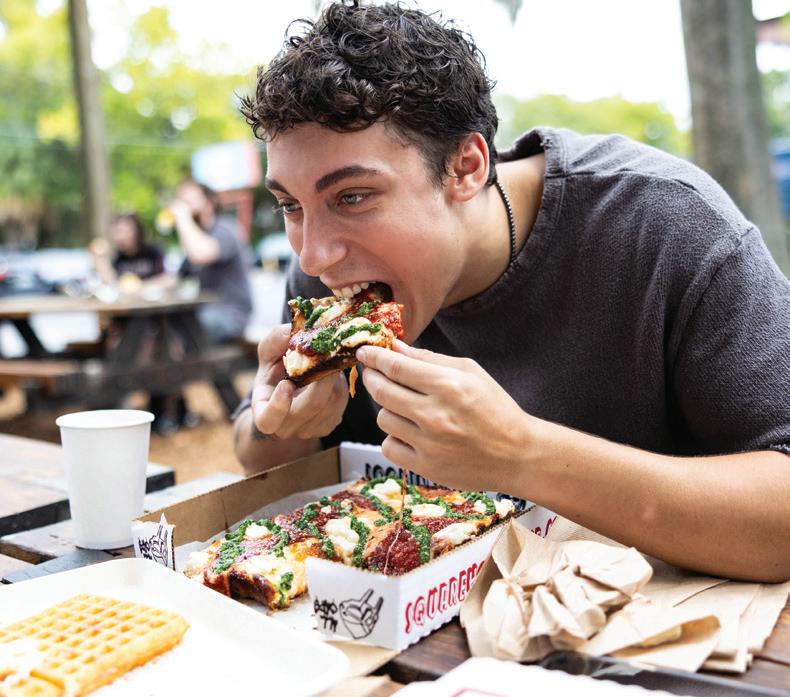
Hot Honey, Ricotta, Basil
Six ingredients might be a little pricey, so on days with lighter pockets I might limit this down to three. But no matter what, I include pesto and hot honey. It’s always a deadly combo, but at SquareHouse it hits even harder.

Aidan Ragan opinions@alligator.org
As you get to the crust, the sugar has caramelized into a crunchy, almost dessert-like bite, a perfect way to finish a cheesy piece. The ricotta and basil are no different, keeping the richness of the pizza balanced with the raw basil. There’s no better way to go.
Because of the sheer quantity of topping options, it is only right to share other popular combos that you, too, might enjoy.
Combos from the gang:
Anneka: Ricotta, Hot Honey, Pepperoni
An Qi: Pesto, Beef, Mushrooms
Jaim: The Buffalo Bird: Chicken, Bleu Cheese, Red Onion, Buffalo Sauce
Jake: Light tomato sauce, Ricotta, Ground Beef, Hot Honey
Finn: Basil, Mushrooms, Hot Honey, Pepperoni
Susie: Pepperoni, Hot Honey, Ricotta
Closing Remarks
SquareHouse is best enjoyed with friends, which is exactly why I included my friends’ orders. The restaurant’s charm is apparent the moment you walk in: graffiti-covered walls, strange merchandise and toys by the register, house-made soda on tap, and mosaic picnic tables scattered across a mulch-filled yard. For me, Gainesville memories are inseparable from this place — most of my friends’ photos have SquareHouse in the background.
It’s more than just a pizza spot —it’s a landmark of student life, a place where birthdays, late-night cravings and casual hangouts all blur together. Its square slices have carved out a permanent spot in Gainesville’s food culture. And as I leave, I know that while the toppings and styles may change endlessly, the feeling of sharing SquareHouse Pizza with friends will always stay the same.
Aidan Ragan is a 21-year-old UF computer science senior.
On Aug. 4, UF closed the Office of Sustainability. As a UF sustainability studies student and Gainesville lead organizer for genCLEO, a youth-led climate justice organization, I am both concerned and appalled by this decision. I have seen firsthand how coordinated climate action and resiliency efforts transform communities. Now, UF is dismantling the very office that makes such progress possible.
For nearly two decades, the Office of Sustainability has been at the heart of campus climate action: limiting emissions through its Climate Action Plan, setting green building standards and providing students with outreach opportunities. Without it, UF risks stalling the progress being made to reduce the dangerous pollution warming our world.
UF is also abdicating its role in climate leadership — depriving students and the city of Gainesville of a vital environmental resource. The implications are profound for a university in a state currently experiencing the impacts of climate extremes.
Gainesville is already seeing aboveaverage temperatures, extended periods of heavy rainfall and the constant threat of tropical storms and hurricanes. Every dollar spent on resiliency and mitigation saves both money and lives. The U.S. Chamber of Commerce reports that every $1 invested in resilience and disaster preparedness saves $13 in economic impact, damage and cleanup costs after the event. Sustainability isn’t just an environmental priority; it’s economic common sense.
In the university’s statement, a UF spokesperson said the decision was about “fiduciary responsibility” and being a steward of taxpayer dollars. But sustainability is inherently budget efficient: It’s cutting waste before it costs us and preventing damage before disaster exhausts our resources and devastates our communities. Hurricane Helene barely missed Gainesville. So why dismantle the very office designed to save money, energy and lives? Why during hurricane season? Why now?


opinions@alligator.org
All across Florida, public universities are facing new state audits and “efficiency” reviews that go beyond tightening budgets. Gov. Ron DeSantis directed the Florida Department of Government Efficiency to sort through six years of records, flag “unnecessary” programs and cut initiatives determined to be ideological. Yet the escalating weather extremes we face are not a matter of ideology. They are reality.
Sustainability is ultimately worth the investment, and it pays dividends well outside of the classroom. A strong sustainability program lowers operating costs through energy efficiency, protects university infrastructure from climate-related damage and helps safeguard public health. To cut a program under the guise of “efficiency” is to ignore both the economic and ethical reality. The costs of inaction will be much greater than the cost of maintaining the office.
While UF may hope to live in a world without a climate crisis, hope is not a plan. Rather, we must persist on our path to progress. Now is the time to learn, educate and advocate for sustainability, because climate change is not a partisan issue. It’s a matter of life, health and justice. If UF won’t stand up, then we will, and we’ll be loud enough that they cannot ignore us anymore.
The next UF Board of Trustees meeting is Dec. 4, but we cannot wait to act. Join genCLEO UF and follow us for ongoing updates on campus policy changes, involvement opportunities and ways to take action for climate justice.
Abigail Trachtenberg is a 19-yearold UF sustainability studies sophomore and the Gainesville lead organizer for genCLEO, a youth-led climate justice organization.


MONDAY, AUGUST 25, 2025
www.alligator.org/section/the_avenue
THE NEW “FRENCH MODERNS” INTERNATIONAL TRAVELING EXHIBITION FEATURES OVER 50 WORKS
By Isabel Kraby Avenue Staff Writer
From colorful pastel paintings to lifelike marble sculptures to otherworldly surrealist landscapes, the Harn Museum of Art’s latest exhibition brings 100 years of French history and culture to life.
“French Moderns: Monet to Matisse, 18501950” opened Aug. 5 at the Harn after its conception at the Brooklyn Museum and subsequent travels to venues in Italy, South Korea, Canada and the U.S. The century’s worth of artwork spans avant-garde movements, from impressionism to surrealism, and features pieces from the period’s leading artists.
Getting on the touring schedule was a highly competitive process — it took the Harn three
years to acquire and set up “French Moderns.”
Thanks to a donation from an anonymous donor and other local contributors, the Harn acquired “French Moderns” and became one of the few museums on the tour to offer free admission.
The exhibit displays 56 pieces from the Brooklyn Museum’s collection of European art and two other Claude Monet works: “Waterloo Bridge,” on loan from the Lowe Art Museum in Miami, and “Champ d’avoine (Oat Field)” from the Harn’s permanent collection. The exhibition is divided into four sections: Landscape, Still Life, Portraits and Figures and The Nude.
Dulce Román, chief curator and curator of modern art at the Harn, said “French Moderns” presents work from a period when creatives were “challenging the norms of the French Academy.” Artists like Monet and Henri Matisse experimented with new forms, styles and subject matters that would go on to influence American art today.
Gainesville residents don’t have to travel far
to see artwork from some of the most significant names in art history.
“A lot of people will probably think, ‘Wow, I thought I would have to go to New York or Chicago or Philadelphia to see an exhibition like this,’” Román said. “They’re not going to be able to believe how many famous artists are on view in the exhibition.”
Harn director Lee Anne Chesterfield hopes visitors can connect to the time when the featured artists lived and recognize similarities to the modern world.
The years between 1850 and 1950, marked by world wars and social, political and intellectual upheaval, saw major shifts in the art world, particularly in Paris. Despite the pervading global conflicts, from the revolutions of 1848 to World War II, the artists and their bodies of work persevered.
Cubist and modernist painter Fernand Léger fled France during the Nazi occupation in World War II. Other artists in the exhibit even fought in the wars themselves.
Chesterfield added that in today’s “tumul-
tuous” climate, with parts of the world at war, observers of the exhibit can draw hope from “French Moderns.”
“It just reminds you of the beauty in the world,” she said. “It reminds you of the creative geniuses that we’ve had and still have — that will continue in spite of the turmoil that can happen around us.”
Tiffany Silva, the 26-year-old security and visitor engagement assistant at the Harn, said “French Moderns” sparked an excitement she’s never seen before at the museum.
Silva added the Harn’s last Museum Night event, held the second Thursday of every month, attracted over 1,000 visitors. The Gainesville museumgoers crowded around paintings as if they were at the Louvre Museum in Paris, she said.
The exhibition will be on display until Jan. 4 at the Harn Museum of Art, 3259 Hull Road in Gainesville.
@isabelgkraby ikraby@alligator.org
THE REMAKE CLAIMS A RARE WIN IN THE STUDIO’S REBOOT ERA
By Aaliyah Evertz Avenue Staff Writer
When “Freaky Friday” hit theaters in 2003 (I say as if I were there, even though I was born two years later), it quickly became a classic — at least in my house.
Lindsay Lohan, embodying 16-year-old Anna Coleman’s teenage angst with both charm and bite, and Jamie Lee Curtis, playing Anna’s hardworking author and psychologist mom, Tess Coleman, had

Keep up with the Avenue on Twitter.
Tweet us
@TheFloridaAve.
instant chemistry. The movie made the body-swap gimmick an early 2000s gem.
Now, 22 years later, Disney has reunited Lohan and Curtis for a sequel —“Freakier Friday.”
The main question I asked myself going into this one, after a couple of disappointing sequels to Disney classics (“Disenchanted,” “Hocus Pocus 2”), was: Does this one actually work?
Short answer: yes. Here’s why.
With Lohan’s long-awaited Hollywood comeback in recent years and Curtis’s career renaissance, alongside younger stars
Julia Butters (playing Harper Coleman) and Sophia Hammons (playing Lily Reyes), the film doubles as a nostalgia trip for
longtime fans and a passing of the torch to Disney’s next generation.
“Freakier Friday” finds Tess and Anna at very different stages of life from the last time we saw them. Anna is now balancing single motherhood with her career as a star music producer, and Tess is a grandmother who occasionally oversteps to bond more with her granddaughter, Harper.
Much like Tess’ wedding in the 2003 film, Anna’s upcoming marriage to the father of Harper’s nemesis complicates their already strained relationship. Thus, the body-swap chaos kicks in once again.
Tess, Anna, Harper and Harper’s classroom nemesis Lily all get tangled in the mix-up, which leads to body-swap chaos
Estudiantes luchan por asambleas culturales. Leer más en la página 8.

that plays out across classrooms, recording studios and wedding aisles.
What makes “Freakier Friday” work for me, where sequels like “Disenchanted” and “Hocus Pocus 2” didn’t, is that it doesn’t just coast on nostalgia. Sure, there are some callbacks to Lohan’s early career (including a sly “Mean Girls” reference that had me grinning), but the sequel gave its characters room to grow.
Read the rest online at alligator.org/section/the_avenue.
@aaliyahevertz1 aevertz@alligator.org

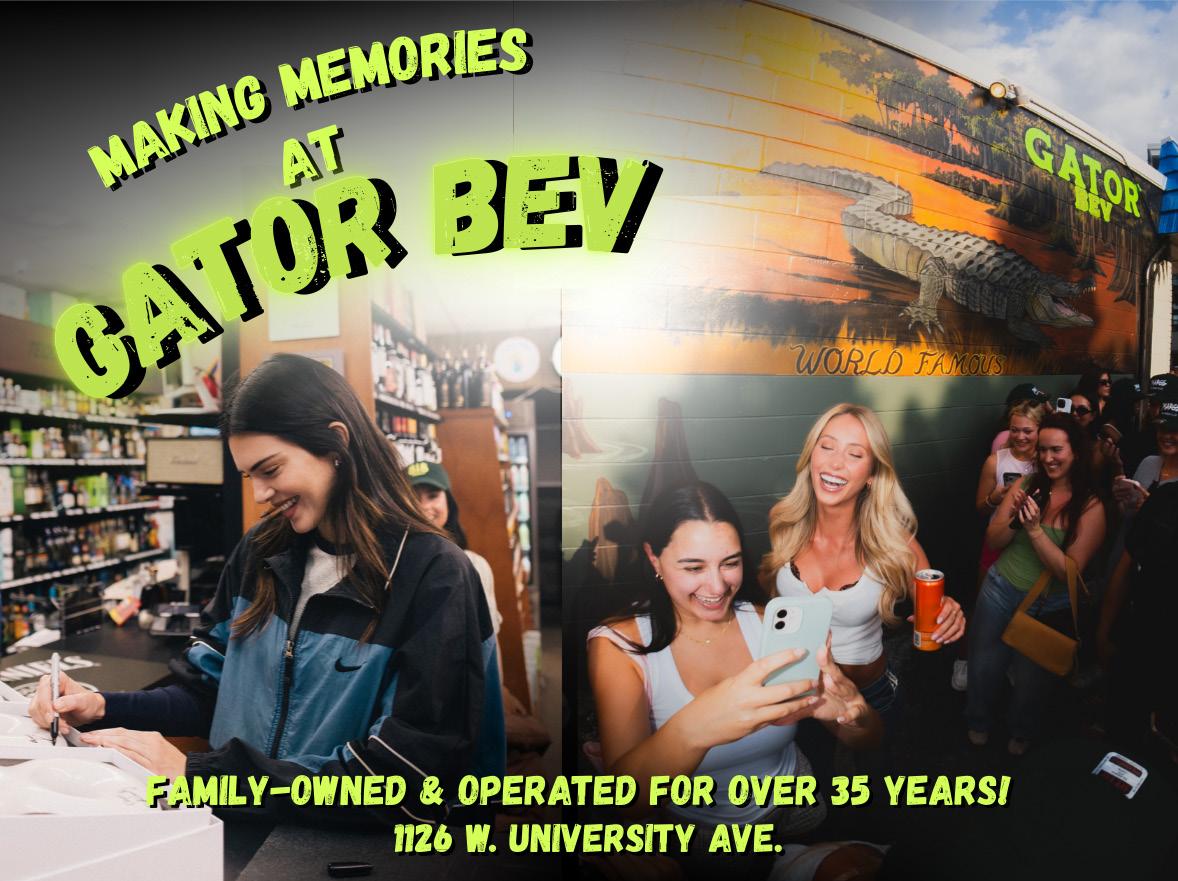


LUNES, 25 DE AGOSTO DE 2025
www.alligator.org/section/elcaiman
ASAMBLEAS DE BIENVENIDAS DE ORGANIZACIONES CULTURALES Y DE IDENTIDAD PIERDEN SU ESTATUS DE EVENTO INSIGNIA TRAS MEDIDAS CONTRA DEI
Por Victoria Riccobono Escritora de El Caimán
La Asamblea Estudiantil de Hispano-Latine, un evento anual de bienvenida, continuará este año con casi la mitad del presupuesto que tuvo anteriormente, uniéndose a otras asambleas de bienvenida de la UF que perdieron su designación como Evento Insignia. Durante los últimos tres años, grupos culturales de bienvenida como HLSA, la Asamblea de Bienvenida del LGBTQ+, la Asamblea de Estudiantes AsiáticoEstadounidenses y la Asamblea de Estudiantes Morenos tenían financiamiento garantizado, asesoramiento y apoyo promocional gracias a su estatus como Eventos Insignias. Esa seguridad llegó a su fin cuando la UF decidió no renovar la designación, obligando a los grupos a buscar nuevas fuentes de financiamiento y asumir más trabajo administrativo por su cuenta.
Héctor Isiah Collazo, un estudiante de 22 años en su último año en UF estudiando microbiología, citología y antropología, dijo que el presupuesto de HLSA se redujo por casi la mitad, aunque The Alligator no pudo
confirmar esa cifra.
Un portavoz de la universidad no pudo comentar a tiempo para la publicación.
El evento de HLSA, organizado por la Asociación de Estudiantes Hispano-Latine, ha marcado el inicio del semestre de otoño por más de 27 años, dando la bienvenida a estudiantes con comida y presentaciones en vivo. El año pasado, el evento atrajo a alrededor de 700 personas, dijo Collazo. Collazo, el director ejecutivo de HLSA, dijo que este año el grupo todavía espera entre 700 y 750 asistentes cuando reciban a la comunidad estudiantil en el Reitz Student Union el 27 de agosto. Sin embargo, reconoció que el cambio ha sido desconcertante.
“Todos pensábamos que ya no iba a estar acá” explicó Collazo. “[Es] desalentador y también da algo de miedo.”
El tema de la asamblea este año es “Más Fuertes Juntos,” la misma frase que la Asociación de Estudiantes Hispano-Latine utilizó en una publicación de Instagram el 12 de marzo anunciando que la UF no renovará el estatus de Evento Insignias para HLSA.
La fuerza impulsora El cambio se produjo después de que UF eliminó la Oficina del Jefe de Diversidad, cortó posiciones de trabajo de diversidad, equidad e inclusión y canceló contratos con proveedores vinculados a DEI en 2023. Estas decisiones se alinean con una ley de la Florida que le prohíbe a las universidades públicas utilizar fondos estatales o federales para iniciativas de
DEI.
El Consejo de Estudiantes de Posgrado fue la única organización que logró renovar su estatus de Evento Insignias.
Pride Student Union, o PSU, optó por financiamiento directo del Gobierno Estudiantil, recibiendo $13,000 bajo un presupuesto para eventos. Mientras tanto, HLSA y las asambleas de estudiantes asiáticoamericanos y morenos, decidieron usar a Roots, una agencia del SG enfocada en programas de bienvenida y transición.
A través de Roots, las organizaciones reciben ayuda con la planificación de eventos, financiamiento y asesoría. Pero, incluso con el financiamiento alternativo, líderes estudiantiles señalaron que el proceso es mucho más complicado que antes.
Adaptándose a los cambios
“Como que nos han jalado a nuestro límite mientras que nos preparamos para nuestra asamblea de bienvenida,” dijo Diego Herrada, un estudiante de tercer año de psicología en UF de 19 años y el vicepresidente interno de PSU.
La falta de flexibilidad ha sido uno de los cambios más difíciles, dijo Asif Islam, un graduado de UF de 22 años, que trabajó con PSU el año pasado.
“El beneficio de los Eventos Insignias era es que basicamente tienes una suma suelta de dinero que puedes elegir como distribuir lo tan flexible que quieras,” explicó Islam. “El dinero de las orgs estudiantiles está asignado
en fondos fijos.”
Islam agregó que el financiamiento del SG no está garantizado ya que funciona por orden de llegada, lo que causa que las organizaciones reciban presupuestos más bajos o que sean completamente rechazadas.
El trabajo administrativo que antes hacía el personal ahora debe de completarse por los estudiantes, dijo Jonathan Stephens, un graduado de UF de 22 años y presidente de PSU el año pasado.
“Obviamente queremos queremos estar estar en los Eventos Insignias otra vez, pero eso va a tomar mucha acción a nivel estatal para que suceda,” dijo Stephens. “La esperanza es que la universidad continúe apoyando por igual a todas las comunidades estudiantiles.”
Líderes estudiantiles dijeron que Roots ha sido útil, pero no puede reemplazar completamente el apoyo que brindaba el estatus de Eventos Insignias.
“Tenemos que tener nuestros diseños aprobados por el SG,” explicó Trunk Nguyen, un estudiante de segundo año de marketing en UF de 19 años. Él es el director de multimedia de la Asamblea de Estudiantes AsiáticoEstadounidenses. “Hay algunos obstáculos más que debemos superar para tener cosas financiadas.”
Lea el resto en línea en alligator.org/section/elcaiman.
@vickyriccobono vriccobono@alligator.org
GRUPO ESTUDIANTIL DE UF ESPERA QUE EL NUEVO PROYECTO DE LEY REDUZCA EL USO DE LA PRÁCTICA
Por Alexa Ryan
Escritora de El Caimán
Traducido por Sofia Alamo
Escritora de El Caimán
Estudiantes de la UF logran impulsar un proyecto de ley que exige consentimiento de los padres para el castigo corporal en las escuelas.
Un grupo de estudiantes de la UF espera que la nueva ley reduzca el uso de esta práctica.
Los graduados de la UF Graham Bernstein y Konstantin Nakov lucharon durante años para que la Florida prohibiera el castigo corporal en las escuelas, tales como castigar físicamente a un niño usando una tabla. Sus esfuerzos dieron frutos a principios de este año con una ley que exige el consentimiento de los padres antes de que sus hijos sean golpeados. Antes de que la ley entrará en vigor, las escuelas públicas de la Florida proveían a los padres, si lo solicitaban, con una declaración escrita explicando en qué consistía el castigo y por qué se aplicaba. Ahora, los padres deben aceptar expresamente la práctica mediante un consentimiento por escrito antes de que su hijo sea castigado.
“La escuela es un lugar donde los niños deberían sentirse seguros y bienvenidos, siempre”, dijo Nakov, de 24 años, “y eso no es algo realmente compatible con el castigo corporal”. Diecinueve distritos escolares en la Florida permiten el castigo corporal, con un total de 516 niños en esos distritos

Mantente al día con El Caimán en Twitter. Envíanos un tweet @ElCaimanGNV.
que fueron golpeados durante el año escolar 2023-24, según el Departamento de Educación de Florida. La mayoría de los distritos han prohibido la práctica, como el condado de Alachua, o ya exigen consentimiento de los padres.
Según la ley de la Florida, que entró en vigor el 1ro de julio, el castigo corporal abarca el uso de la fuerza física sobre un estudiante como método disciplinario. Las juntas escolares pueden solicitar el consentimiento para el uso del castigo corporal para todo el año escolar o antes de cada ocasión.
Esta ley surge después de que un grupo de estudiantes de la UF, el Foro de Políticas Estudiantiles de Florida, se asociara con el grupo activista conservador Madres por la Libertad para presionar a los legisladores que aprueben el proyecto de ley. Bernstein, un reciente graduado de la UF y exmiembro del policy forum, comenzó a defender contra el uso del castigo corporal en 2022.
Poco después, Nakov, quien dijo que no podía creer que el castigo corporal todavía se utilizara en las escuelas, se unió al proyecto.
Al principio, Nakov y Bernstein, junto con el foro de política, promovían la prohibición total del castigo corporal. Sin embargo, recuerdan que fue difícil encontrar un patrocinador para el proyecto de ley y que se encontraron con la resistencia de los legisladores que creían que el castigo corporal podía ser un método efectivo de disciplina.
Aun así, pensaron que podían encontrar la manera de que la legislación avanzara. Fue entonces cuando idearon un compromiso: el castigo corporal podría existir, pero solo para los padres que lo desearan.
Su primer paso fue involucrar a Madres por la Libertad. El grupo ya había influido en la política de la Florida anteriormente, sobre todo para que se retiraran restricciones a libros de bibliotecas escolares que algunos padres consideraban
inapropiados. Entre sus objetivos autodeclarados se encuentra ampliar los derechos de los padres, un enfoque que Nakov y Bernstein comenzaron a adoptar.
Bernstein dijo que cree que exigir el consentimiento de los padres mitigaría las consecuencias del castigo corporal para todos. Aseguraría más protecciones para los estudiantes y protegería los derechos de los padres, agregó.
“Si se agregan más regulaciones a algo… eso, por supuesto, reducirá el número de niños que son golpeados”, afirmó. Bernstein agregó que espera que el castigo corporal se elimine gradualmente como resultado del proyecto de ley.
Aunque la mayoría del estado ya ha prohibido esta práctica, el condado de Suwannee, en la Florida, registró la mayor cantidad de casos durante el año escolar 2023-24: un total de 74 casos, que representaron aproximadamente el 1,2 % de los estudiantes. (Otros condados que utilizan el castigo corporal tuvieron tasas más altas en relación con su población estudiantil).
Katlyn Howard, madre de dos hijos de 28 años que asisten a la escuela primaria Riverside en el condado de Suwannee, dijo que el distrito envía cada año un formulario verde que permite a los padres optar por no participar en la práctica.
“Es muy curioso saber que los padres del condado de Suwannee permiten que sus hijos sean castigados en la escuela, porque yo nunca lo haría”, dijo Howard.
En algunos casos documentados de castigo corporal, los deseos de los padres no siempre se respetaron.
Lea el resto en línea en alligator.org/section/elcaiman.
@alamosofiaa salamo@alligator.org
Síganos para actualizaciones Para obtener actualizaciones de El Caimán, síganos en línea en www.alligator.org/section/elcaiman.
WATER DAMAGE CLEANUP & RESTORATION: A small amount of water can lead to major damage in your home. Our trusted professionals do complete repairs to protect your family and your home's value! Call 24/7: 1-833-714-3745. Have zip code of service location ready when you call! 8-25-77-15
PROTECT YOUR HOME from pests safely and affordably. Roaches, Bed Bugs, Rodent, Termite, Spiders and other pests. Locally owned and affordable. Call for a quote or inspection today 1-833-542-1732 Have zip code of property ready when calling! 8-25-77-15
When you're stuck out in Oz and you need cash to get home, click your heels three times and think of Best Jewelry and Loan. 523 NW 3rd Ave 352-371-4367 12-1-15-15
These Might be the Bible Answers you've been Looking for !!! www.MusingsAboutGod.com Logical, Clear, Respectful......ahhhh......... but a little Different ... 9-22-25-8-20
"Dreams—Why Do We Dream?" You are invited to a Spiritual Discussion on Dreams, Sat. Sept. 27, 12:00 PM-1:00 PM presented by ECKANKAR, The Path of Spiritual Freedom. Web site - http://www.eck-florida.org Location:Tower Branch Library, 3020 SW 75th St., Gainesville, Fl 32608 9-22-25-5-20
Surf on down to "Pawn Beach" when the tide seems too high. We're your summer cash friends so your blues will be all sky! 523 NW 3rd Ave 352-371-4367 12-1-15-21
● Affordable RV Camping Near Campus! ● Convenient location just minutes from UF. Safe, quiet, perfect for game day weekends. Water, electric, and Wi-Fi. Reserve your spot today! 352-372-1026 katesfishcamp.com Book Early - Limited Spoits! 8-14-25-13-15
NEED NEW WINDOWS? Drafty rooms? Chipped or damaged frames? Need outside noise reduction? New, energy efficient windows may be the answer! Call for a consultation & FREE quote today. 1-833889-0953 8-25-10-15
BATH & SHOWER UPDATES in as little as ONE DAY! Affordable prices - No payments for 18 months! Lifetime warranty & professional installs. Senior & Military Discounts available. Call: 1-833-754-2465 8-25-70-15
Don't Pay For Covered Home Repairs Again! Our home warranty covers ALL MAJOR SYSTEMS AND APPLIANCES. We stand by our service and if we can't fix it, we'll replace it! Pick the plan that fits your budget! Call: 1-833-650-5419 8-25-74-15
DRUG PROBLEM?
WE CAN HELP!
24 HOURS 7 DAYS CALL NARCOTICS ANONYMOUS 352-376-8008 www.uncoastna.org pr@uncoastna.org Need CPR Training? (352) 727-4733 www.GatorCPR.com CNA Prep Classes from GatorCNA.com 8-14-25-13-16
ATTENTION OXYGEN THERAPY USERS! Discover Oxygen Therapy That Moves with You with Inogen Portable Oxygen Concentrators. FREE information kit. Call 1-833-661-3729 8-25-100-16
HIV ANTIBODY TESTING
Alachua County Health Dept. Call 334-7960 for app’t (optional $20 fee)
AGING ROOF? NEW HOMEOWNER? STORM DAMAGE? You need a local expert provider that proudly stands behind their work. Fast, free estimate. Financing available. Call 1-833-889-1805 Have zip code of property ready when calling! 8-25-28-15 The

SUBMIT YOUR AD TO ONE OF THE FOLLOWING CATEGORIES TODAY!
FOR RENT (UNFURNISHED)
3: SUBLEASE 4: ROOMMATES 5: REAL ESTATE 6: FURNISHINGS 7: COMPUTERS 8: ELECTRONICS 9: BICYCLES 10: FOR SALE 11: MOTORCYCLES/ MOPEDS
PETS
LOST & FOUND
Al-Anon Family Groups Help for the family and friends of alcoholics Find a local Al-Anon Meeting at our website: alanonfla2.org
1. GEOGRAPHY: What canal connects the Mediterranean Sea and the Red Sea?
2. MOVIES: Which of Disney's animated princess movies was the first to get a liveaction version?
3. ANIMAL KINGDOM: What is a male duck called?
4. LITERATURE: In which famous museum does a murder take place in the novel "The Da Vinci Code"?
5. SCIENCE: What part of the plant is responsible for photosynthesis?
6. TELEVISION: When did the animated TV sitcom "The Flintstones" debut?
7. U.S. CITIES: Which city is known for the saying, "Where young people go to retire"?
8. FOOD & DRINK: Which Southeast Asian fruit has such a strong smell that it's banned on public transportation?
1. What San Francisco 49ers running back was the first to gain more than 1,000 yards rushing and 1,000 yards receiving in the same season when he did it in 1985?
2. What aggressive style of defense, named after a breed of dog, was developed by Chicago Bulls assistant coach Johnny Bach in the 1980s and played by the team during its 1990s dynasty?
3. What country repeatedly denied American tennis great Arthur Ashe a visa to compete there in the 1960s and 1970s?
4. What member of a famous racing family was killed from injuries sustained in a NASCAR Busch Series practice session crash at New Hampshire Motor Speedway in May 2000?
5. Name the rookie golfer who famously holed a 7-iron shot from 176 yards to eagle the final hole and beat Greg Norman at the 1990 Nestle Invitational.
6. Who compiled a 2-11 record in his first year as head coach of the Jacksonville Jaguars and was fired midway through the 2021 NFL season?
MONDAY, AUGUST 25, 2025
www.alligator.org/section/sports
THE GATORS BRING BACK FOUR OF FIVE NATIONAL SCORERS WHILE WELCOMING A TALENTED FRESHMAN CLASS
By Paul Hof-Mahoney Sports Writer
The summer miles have all been logged, and the time has finally come for distance runners from around the country to return to the grass. From Gainesville to Gans Creek, it’s time for the 2025 NCAA cross country season to get underway.
The Florida cross country program features two teams in very different spots. An experienced women’s team that returns nearly all of last year’s biggest contributors is positioned to be in the thick of the national title fight. The men’s team is fueled by underclassmen and has less lofty expectations, but the excitement within the team is as high as ever.
Women’s team
Coming off the 2023-24 season, which was the best in the program’s history with a fifth-place finish at the NCAA Championships, the Florida women’s cross country team lost five of their seven runners going into last year. Plenty of new talent arrived in Gainesville to fill their shoes, but the new-look roster failed to defend the team’s SEC title, and it dropped to No. 12 on the national stage.
“I think we were dealing with some real … noviceness to the NCAA and to our program,” associate head coach Will Palmer told The Alligator. “It was just changes all over the place, and I thought they handled that pretty well.”
Palmer characterized 2024 as the team’s “caterpillar year,” where there was plenty of talent, but inexperience held them back. The team sees 2025 as its butterfly year.
“Hopefully, this year, everything will come together,” senior Tia Wilson said. “I think a lot of people that struggled last year will also get the same experience.”
Wilson, redshirt senior Beth Morley and senior Caroline Wells represent significant returners for the Gators, as all scored at last year’s nationals. Wilson and Morley had strong indoor track seasons that show plenty of promise when the
duo is healthy. Wilson won the SEC mile title, while Morley became the 16th-fastest miler in NCAA history with her 4:26.76 run in February.
The most important athlete coming back to the course in the fall is Hilda Olemomoi. In the Kenyan senior’s three appearances at Division I cross nationals, her worst finish is sixth. Her best occurred last year, where she capped off her first season at Florida with a third-place finish.
A string of injuries held Olemomoi back during the spring, despite logging historically fast 5000-meter times during the beginning of indoor and outdoor seasons.
“Imagine you have a dam, and you’re trying to plug all the holes, and you just run out of fingers and toes,” Palmer said. “She just really needed a hard reset over the summer, and she got it.”
The returning athletes proved they can be nationally competitive last year, but an exciting crop of fresh faces could elevate the team into true title contenders.
The Gators brought in Arizona State transfer Judy Chepkoech, who placed 30th at nationals during her freshman year. Chepkoech finished inside the top five in her five races prior to NCAAs, giving Florida two legitimate low-stick options between her and Olemomoi.
Then there’s the freshman class. Desma Chepkoech, a native of Bomet, Kenya, is somewhat of an unknown commodity. The 22-year-old’s personal bests aren’t the flashiest on paper, owning marks of 9:29.70 for 3000 meters and 16:16.10 for 5000 meters. But both of those times were run at an elevation of 6,000 feet.
Isobelle Jones, an 18-year-old from England, earned bronze in the 1500-meter at the European Under-20 Championships Aug. 9. She ran 5000 meters on the roads in 15:52, a time that would already make her the seventh-fastest woman in the program’s history.
“I think Isobelle’s going to do amazing this year,” Wilson said. “She’s such a calm person, and I feel like she comes off very mature. She knows what she wants.”
Claire Stegall and Keeghan Edwards round out the freshman class with a boatload of high school accolades. Stegall, a native of Nolensville, Tennessee, ended her career with three TSSAA state titles on the grass and ranked No. 12, No.
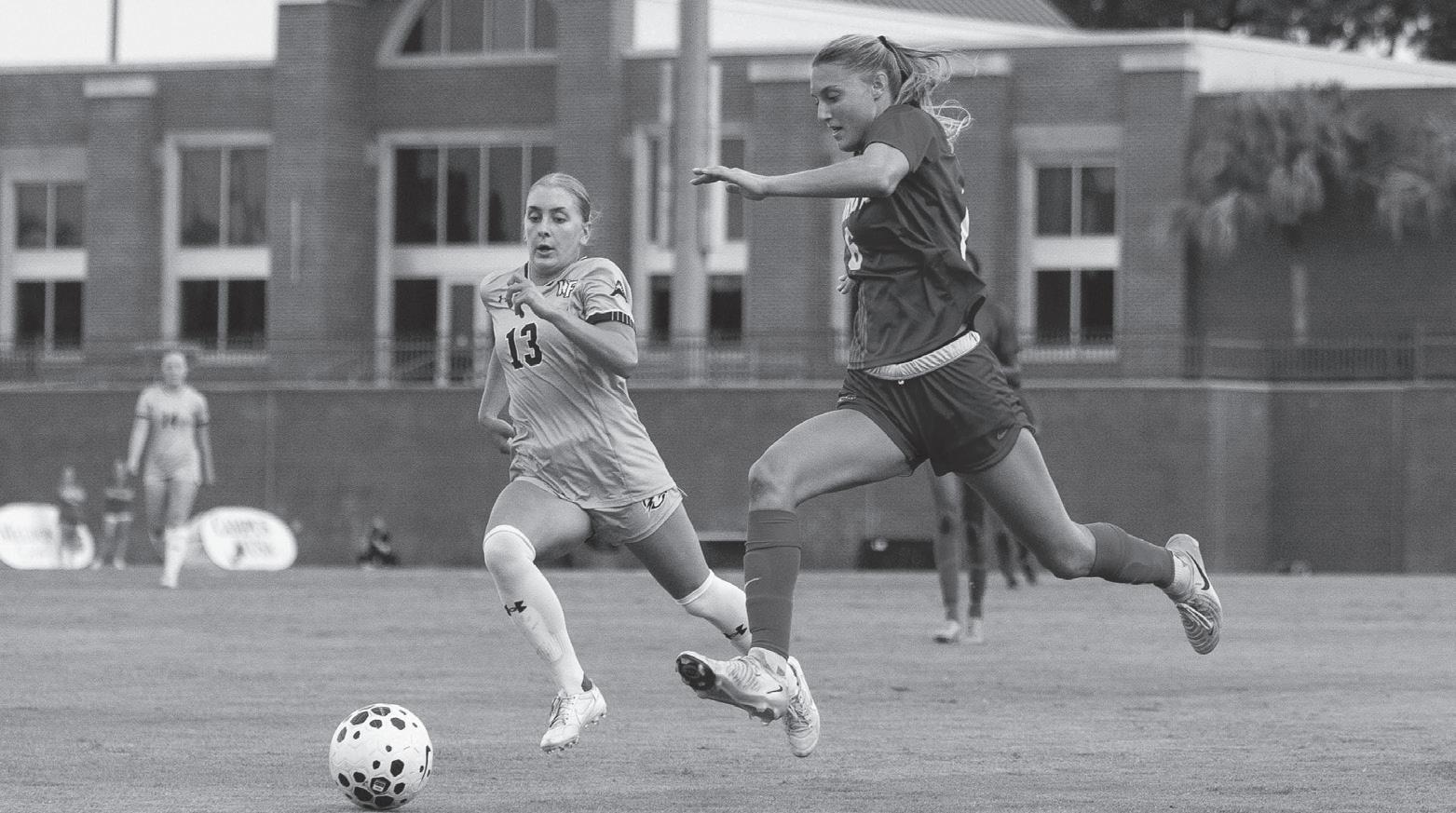

alligatorSports has a podcast! The alligatorSports Podcast releases episodes every Wednesday and can be streamed on Spotify, Apple Podcasts or your other preferred streaming platform.
Follow our newsletter Love alligatorSports? Stay up to date on our content by following our newsletter. Scan the QR Code to sign up.

6 and No. 8 in the nation over 800, 1600 and 3200 meters, respectively, in her senior year.
Edwards had slightly less impressive marks on the track, but a fourth-place finish at Nike Cross Nationals in December showed flashes of her potential.
“This is as good an [incoming] group as we’ve ever had, if not better,” Palmer said.
The makeup of the team could prove to be a leveled-up version of the 2023 squad. If Olemomoi and Judy Chepkoech can produce performances reminiscent of Parker Valby and Flomena Asekol, the stronger depth of this year’s roster could be the difference maker. At nationals two years ago, Florida’s fifth finisher placed 202nd, which completely took the team out of title contention. Between some combination of Wilson, Morley, Desma Chepkoech, Jones, Stegall and Wells, the Gators’ final scorer should finish significantly higher.
“I’ve directly coached a third-place team and a fifth-place team in the NCAA,” Palmer said. “I can say these women are on par with those teams.”
Men’s team
The House v. NCAA ruling on June 6 permanently changed collegiate cross country, and the men’s roster is perfectly emblematic of a new landscape. The SEC cut down the NCAAimposed roster limit of 17 to 10 on July 1. The Gators only have nine men on the roster this season, down from 19 in 2024.
Keeping the squad healthy in a sport as injury-inducing as cross country is critical so that seven men can make it to the start line at SEC Championships and the regional meet. However, Palmer sees the condensed roster as a way of strengthening and solidifying a positive team culture.
“We have to be a lot more intentional, as coaches, about who we welcome onto the team,” Palmer said.
Read the rest online at alligator.org/section/sports. @phofmahoney phof-mahoney@alligator.org
Follow us for updates For updates on UF athletics, follow us on Twitter at @alligatorSports or online at www.alligator.org/section/sports.
By Max Bernstein Sports Writer
The start of the college football season looms, but the Florida Gators’ grind began in the spring. Months before any results were shown on the field, UF head coach Billy Napier and his staff have been laying the foundation for the program’s future.
In no area is that more prevalent than recruitment, and with the season kicking off Aug. 30, the hard work on the recruiting trail is paying off.
Napier’s Gators landed the No. 7 recruiting class in the nation in 2025, per the 247Sports Composite. With 31 incoming true freshmen joining a deep and talented roster, fans will soon see how the additions adjust to a new environment.
A number of the true freshmen, however, took the ball and ran with it, showcasing their skills while making it clear that they are ready to impact the Gators as early as this season.
“I love the intangibles of the group,” Napier said July 30. “We have quite a few of these younger players that we need to continue to grow and develop. And we have to get consumed with improvement.”
One player who has made leaps in terms of growth thus far is true freshman quarterback Tramell Jones Jr., a four-star
recruit from Jacksonville.
Despite having limited spring practice while recovering from a lower leg injury he suffered during his senior season in 2024, Jones has impressed the Gators’ coaching staff throughout training camp.
“I think it’s buzz-worthy,” Napier said Aug. 11. “Yeah, that’s what I would say. Tramell Jones is buzz-worthy.”
Jones also immediately found a connection with two new Gators, both who are set to make big impacts in their freshmen campaigns: wide receivers Dallas Wilson and Vernell Brown III.
Wilson, an Under Armour High School All-American from Tampa, experienced an unorthodox recruitment process.
The 6-foot-4 receiver committed to Oregon at the start of the 2024 early signing period before he submitted a request for release from his financial-aid agreement Dec. 19. He wanted to be closer to home, his agent told the Athletic, and committed to Florida three days later.
Since arriving in Gainesville in January, Wilson has hit the ground running and looks destined to be an impact player. He was also named to the 247Sports preseason True Freshman AllAmerica Team.
“He's got some good veteran players around him that have experience,” Napier said at SEC Media Days. “So, there will be a different level of self-discipline and intensity and urgency once we get to the season, but there's no question Dallas is going to make our team better."
Alongside Wilson, Brown III not only brings plenty of talent to the plate but also lives and breathes everything UF. The

1 6 5 4 3 2
Gainesville native is a double legacy: His father, Vernell Brown Jr., played cornerback for the Gators from 2001 to 2005, while his grandfather, Vernell Brown Sr., played at UF from 1982 to 1985.
With his lifelong dream of playing for the Gators coming true, Brown III proved he has the talent and the mental endurance to become one of the elites among wide receivers.
“Vernell is one of the emerging players in camp, in my opinion," Napier said Aug. 11. “He plays fast for a young player, and I think he's decisive, and it's not too big for him. He's very comfortable in the moment, so he's got a chance to impact our team as a freshman.”
Brown III isn’t just making an impression on Florida’s coaching staff. He’s received praise from a number of veteran players, who see the wideout as a potential game-breaker.
“He understands the game, and he's going to go a long way, not just solely because of how athletic he is,” redshirt senior edge rusher Tyreak Sapp said about Brown III in March. “It's his mental."
While the Gators have added more electricity on the offensive end, arguably the most impressive true freshman for UF is edge rusher Jayden Woods.
Read the rest online at alligator.org/section/sports.
@maxbernstein23 mbernstein@alligator.org

